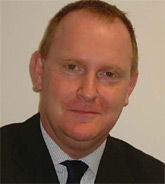
 |
| Jon Pritchard |
Maren Bennette talks to John Pritchard, the new man in charge at Westcon
When you are the man in charge of the largest specialist networking distributor in the UK, if not in the whole of Europe, you are in great demand. Jon Pritchard is that man, since March 1st when the sister companies Comstor and Westcon were merged to form Westcon Group UK. Since that time Pritchard has been called on by all his major vendors and also travelled to San Diego for the Cisco Partner Conference. When I met with him in late March he was just beginning to catch his breath after three very hectic months.
I asked him why the two companies were consolidated into one.
“Having two separate operating companies in the UK didn't make sense, either from a management point of view or from a cultural point of view. Each part of the newly merged company had its strengths and weaknesses. By bringing them together we can maximise the benefits and minimise the drawbacks.”
Pritchard went on to identify what those strengths are; “Comstor was and, as a brand within the Westcon Group UK, will continue to be a very customer focussed organisation. We offer our resellers strong account management and excellent professional services which customers have been willing to pay that little bit extra for. Westcon, on the other hand, has always been very sales driven, with multiple vendors competing for mindshare with both our staff and our customers. By bringing the two styles together we are going to offer the channel the best range of products, with the best account management and the best range of professional services from any distributor in the country.”
How did Cisco react to the merger, I asked? “They were delighted. Of course we talked with them before we decided to make the consolidation. They account for £200 million of the combined group turnover of £260 million, so there was no way we would have done it if Cisco hadn’t agreed.”
He went on to say that Cisco would now have access to the large number of voice resellers that were Westcon customers, channel partners which the West Coast networking giant has tried to woo on more than one occasion without much success. Conversely of course, the other vendors in the Westcon stable (the largest being Avaya, Mitel and Nortel) will now have access to the hundreds of Cisco resellers, which might not go down quite so well at Bedfont Lakes.
Will the consolidation mean any changes in location or reduction in headcount, I asked? “No,” Pritchard replied. “We are doing this to invest in our business, not to save money. We will still be operating from both Cirencester and Slough, with the two separate brands having their own marketing people, their own account teams and their own product specialists. Anyway, we would have failed miserably had we tried to move people from Cirencester to Slough, and I would probably end up like David Brent, in The Office – being made redundant,” he said with a smile. “What we had already done some years ago was to combine the warehousing and information systems of the two companies. That is why the merger was relatively painless and took such a short time,” he added.
Having all that information on the sales of four of the major IP communications vendors in the market must give him a powerful insight into the state of the market, I mused. “That’s true to a certain extent. We have a good view on what is happening in the mid-sized and smaller business sectors which tend to buy from resellers which in turn buy from a distributor. What we don’t see is the sales into large enterprise customers that tend to go through the systems integrators and outsourcers which have direct purchase agreements with the vendors. Having said that, we can see that the IP communications business is booming in the sectors we have visibility of.”
So what messages would you have for those vendors you deal with, given what you are seeing in the market, I asked? “Please be willing to listen to what we have to say. We see lots of strategies and tactics being dreamt up in North America and exported to the UK without taking into account the differing market conditions here. Of course, some of those strategies and tactics are good and work well over here. But some of them aren’t and don’t.”
Pritchard wouldn’t be drawn on which vendors’ strategies and tactics he was referring to but I surmise that, as he had just returned from the Cisco channel partner conference, he may have been alluding to the changes to the channel structure announced in San Diego, which have been met with widely varying responses from the
channel.
